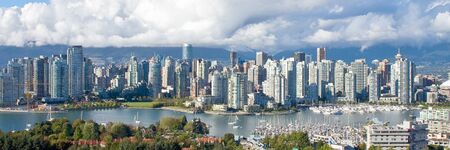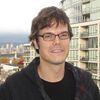Vancouver BC: Difference between revisions
Created page with "{{Infobox municipality |municipality= City |established = April 6, 1886 |image = Concord Pacific Master Plan Area.jpg |image_caption = |image_seal = Coat_of_arms_of_Vancouver..." |
No edit summary |
||
| Line 1: | Line 1: | ||
{{Infobox municipality | {{Infobox municipality | ||
|image=Concord Pacific Master Plan Area.jpg | |||
|image_caption=Concord Pacific Master Plan Area | |||
|image = Concord Pacific Master Plan Area.jpg | |image_seal=Coat_of_arms_of_Vancouver.svg | ||
|image_caption = | |municipality=City | ||
|image_seal = Coat_of_arms_of_Vancouver.svg | |established=April 6, 1886 | ||
|area = 44.47 sq.mi | |area=44.47 sq.mi | ||
|elevation = 500 ft | |elevation=500 ft | ||
|population = 662,248 | |population=662,248 | ||
|website = https://vancouver.ca/ | |website=https://vancouver.ca/ | ||
|timezone = PST | |timezone=PST | ||
|description= | |description=Vancouver is a major city in western Canada, located in the Lower Mainland region of British Columbia. As the most populous city in the province, the 2021 census recorded 662,248 people in the city, up from 631,486 in 2016. The Greater Vancouver area had a population of 2,642,825 in 2021, making it the third-largest metropolitan area in Canada. Vancouver has the highest population density in Canada, with over 5,400 people per square kilometre. Vancouver is one of the most ethnically and linguistically diverse cities in Canada: 52 percent of its residents are not native English speakers, 48.9 percent are native speakers of neither English nor French, and 50.6 percent of residents belong to visible minority groups. | ||
Vancouver is a major city in western Canada, located in the Lower Mainland region of British Columbia. As the most populous city in the province, the 2021 census recorded 662,248 people in the city, up from 631,486 in 2016. The Greater Vancouver area had a population of 2,642,825 in 2021, making it the third-largest metropolitan area in Canada. Vancouver has the highest population density in Canada, with over 5,400 people per square kilometre. Vancouver is one of the most ethnically and linguistically diverse cities in Canada: 52 percent of its residents are not native English speakers, 48.9 percent are native speakers of neither English nor French, and 50.6 percent of residents belong to visible minority groups. | |||
}} | }} | ||
Vancouver is one of the most livable cities in Canada and in the world. In terms of housing affordability, Vancouver is also one of the most expensive cities in Canada and in the world. Vancouver plans to become the greenest city in the world. Vancouverism is the city's urban planning design philosophy. | Vancouver is one of the most livable cities in Canada and in the world. In terms of housing affordability, Vancouver is also one of the most expensive cities in Canada and in the world. Vancouver plans to become the greenest city in the world. Vancouverism is the city's urban planning design philosophy. | ||
Latest revision as of 05:22, April 28, 2022
- Members
Vancouver is a major city in western Canada, located in the Lower Mainland region of British Columbia. As the most populous city in the province, the 2021 census recorded 662,248 people in the city, up from 631,486 in 2016. The Greater Vancouver area had a population of 2,642,825 in 2021, making it the third-largest metropolitan area in Canada. Vancouver has the highest population density in Canada, with over 5,400 people per square kilometre. Vancouver is one of the most ethnically and linguistically diverse cities in Canada: 52 percent of its residents are not native English speakers, 48.9 percent are native speakers of neither English nor French, and 50.6 percent of residents belong to visible minority groups.
Activities

|
Bidirectional EV Charging Hub in British Columbia | |
| Pilot Project with BC Hydro, Lion Electric, BorgWarner, PowerTech Labs and Fermata Energy demonstrates Technical Feasibility as a Proof of Concept to Make Vehicle-to-Grid a Reality in British Columbia and Globally | ||

|
Hello Lamp Post UBC Campus | |
| Initially launched as a pilot project, Hello UBC was designed to innovatively engage students and staff on campus, to support the parking and access services team. Their goal was to communicate key messages and gain insights into the behaviours of commuters and visitors around campus. | ||

|
Air Quality Monitoring Network | |
| Air Pollution is an urgent problem linked to as many as nine million deaths per year worldwide and 14,000 annually in Canada, primarily from related heart and lung diseases. On UBC campus, sources of air pollution include personal vehicles, construction, restaurants, and businesses. In fact, the BC Air Quality Health Index can change from “Low-Risk” to “High-Risk” on campus during air pollution events such as wildfires. To address this, we have installed a network of 8 low-cost air quality sensors across UBC campus to measure air pollutant concentrations at different locations on campus. | ||
Details
Vancouver is one of the most livable cities in Canada and in the world. In terms of housing affordability, Vancouver is also one of the most expensive cities in Canada and in the world. Vancouver plans to become the greenest city in the world. Vancouverism is the city's urban planning design philosophy.
Indigenous settlement of Vancouver began more than 10,000 years ago, and the city is on the traditional and unceded territories of the Squamish, Musqueam, and Tsleil-Waututh (Burrard) peoples. The beginnings of the modern city, which was originally named Gastown, grew around the site of a makeshift tavern on the western edges of Hastings Mill that was built on July 1, 1867, and owned by proprietor Gassy Jack. The original site is marked by the Gastown steam clock. Gastown then formally registered as a townsite dubbed Granville, Burrard Inlet. The city was renamed "Vancouver" in 1886, through a deal with the Canadian Pacific Railway (CPR). The Canadian Pacific transcontinental railway was extended to the city by 1887. The city's large natural seaport on the Pacific Ocean became a vital link in the trade between Asia-Pacific, East Asia, Europe, and Eastern Canada.
Vancouver has hosted many international conferences and events, including the 1954 Commonwealth Games, UN Habitat I, Expo 86, APEC Canada 1997, the World Police and Fire Games in 1989 and 2009; several matches of 2015 FIFA Women's World Cup including the finals at BC Place in Downtown Vancouver, and the 2010 Winter Olympics and Paralympics which were held in Vancouver and Whistler, a resort community 125 km (78 mi) north of the city. In 1969, Greenpeace was founded in Vancouver. The city became the permanent home to TED conferences in 2014.
As of 2016, Port Metro Vancouver is the fourth-largest port by tonnage in the Americas, the busiest and largest in Canada, and the most diversified port in North America. While forestry remains its largest industry, Vancouver is well known as an urban centre surrounded by nature, making tourism its second-largest industry. Major film production studios in Vancouver and nearby Burnaby have turned Greater Vancouver and nearby areas into one of the largest film production centres in North America, earning it the nickname "Hollywood North".




